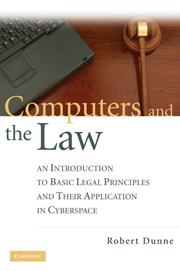Book contents
- Frontmatter
- Contents
- PREFACE
- ACKNOWLEDGMENTS
- 1 THE COMMON LAW AND STATUTORY LAW
- 2 CONTRACTS
- 3 TORTS INTRODUCTION
- 4 DEFAMATION
- 5 THIRD PARTY LIABILITY
- 6 COPYRIGHTS
- 7 TRADE SECRETS
- 8 TRADEMARKS
- 9 THE RIGHT OF PRIVACY
- 10 E-MAIL
- 11 THE RIGHT OF PUBLICITY
- 12 CONSTITUTIONAL LAW
- 13 PORNOGRAPHY AND OBSCENITY
- 14 ADVERTISING AND SPAM
- 15 JURISDICTION
- AFTERWORD
- INDEX
AFTERWORD
Published online by Cambridge University Press: 05 June 2012
- Frontmatter
- Contents
- PREFACE
- ACKNOWLEDGMENTS
- 1 THE COMMON LAW AND STATUTORY LAW
- 2 CONTRACTS
- 3 TORTS INTRODUCTION
- 4 DEFAMATION
- 5 THIRD PARTY LIABILITY
- 6 COPYRIGHTS
- 7 TRADE SECRETS
- 8 TRADEMARKS
- 9 THE RIGHT OF PRIVACY
- 10 E-MAIL
- 11 THE RIGHT OF PUBLICITY
- 12 CONSTITUTIONAL LAW
- 13 PORNOGRAPHY AND OBSCENITY
- 14 ADVERTISING AND SPAM
- 15 JURISDICTION
- AFTERWORD
- INDEX
Summary
Unlike most inventions and technologies, the development of computing is a story of unintended consequences. The elevator was invented to permit the vertical growth of cities; the automobile was invented to speed transportation; the telegraph and telephone to enhance communication across distances. Those inventions have retained their original purpose. The computer, on the other hand, was devised as a machine to speed up mathematical calculations. No one foresaw that it would ultimately become the single most ubiquitous communication device known and the portal for each computer user on the Net to a vast new world called cyberspace, with its own social norms and, consequently, a significant impact on law.
Perhaps the single most critical issue we must confront in foreseeing (for we may in the end be powerless to decide) the future of cyberspace and its effect on the legal system is the issue of accountability versus anonymity. Traditional notions of personal jurisdiction, for example, rely on being able to identify the party over whom jurisdiction is asserted; conduct, such as gambling, cannot be effectively regulated absent the ability to identify the party whose conduct is to be controlled, or sovereignty over the place in which the conduct is “happening.” The level of protection accorded to personal privacy is, and always has been, a balancing act between society's interest in promoting freedom of personal expression and activity versus society's interest in protecting itself and its members from harm, with the latter goal predicated on identification.
- Type
- Chapter
- Information
- Computers and the LawAn Introduction to Basic Legal Principles and Their Application in Cyberspace, pp. 425 - 426Publisher: Cambridge University PressPrint publication year: 2009



